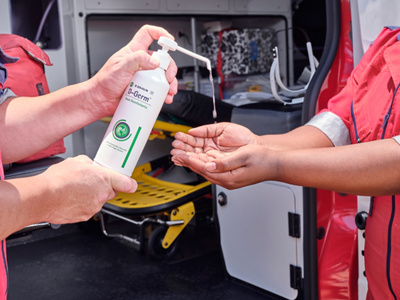Find out about the stringent hand hygiene practices ER24 has in place to keep our patients safe.
Patient safety is key
Many of the patients that ER24 treats in the pre-hospital environment are immune compromised or facing critical conditions, says Maxine Dickson-Hall, a Critical Care Specialist at ER24 and the risk of infection can be life-threatening. “Ambulances and medical aircraft are high-risk environments for the contamination by and proliferation of micro-organisms. Infection with pathogens (germs) can make patients sicker or prolong their recovery and healing,” she explains.
In its 2024 campaign, the World Health Organization (WHO) underscores how serious this problem is. Infections in healthcare happen frequently and the WHO highlights the fact that correct handwashing, when done consistently and at the right times, saves millions of lives every year.
ER24’s commitment to hand hygiene
“At ER24, ensuring the highest standards of patient safety is non-negotiable, and we’ve implemented stringent protocols to ensure our medics uphold impeccable and mandatory hand-hygiene practices,” says Dickson-Hall:
- Use gloves whenever there’s a risk of bodily fluid contact with patients.
- Wash hands before and after patient interactions.
- Change gloves promptly if soiled and dispose of them in red biohazard bags within ambulances and aircrafts.
- ICU vehicles are equipped with handwash facilities and extractor fans to reduce the higher risk of pathogens in compromised patients.
Hand-hygiene education and training
Education and training, as well as access, are the key to reinforcing hand hygiene among ER24 paramedics, says Dickson-Hall. “We assess our healthcare staff on their hand-hygiene practices and provide ongoing training to reinforce proper techniques. We also make basins, soap, and paper towels available near every patient area.”
ER24 paramedics are trained to wash their hands at each of the 5 Moments of Hand Hygiene:
- Before touching a patient
- Before a procedure
- After a procedure
- After touching a patient
- After touching a patient’s surroundings.
This approach ensures medics have the knowledge and ability to make patient safety their top priority by practising meticulous hand hygiene.
Despite these measures, medics face challenges sticking to rigorous practices, especially in confined spaces like ambulances and aircraft. “However, when there are no handwashing facilities in aircraft and ambulances, our medics rely on hand sanitiser and sanitising wipes,” Dickson-Hall assures.
Enhanced hand-hygiene: the way forward
Looking ahead, Dickson-Hall envisions new strategies and technologies that could further improve how hand hygiene is practised in healthcare. “Ensuring handwash basins are available within all ambulances would be one practical step towards improving hand hygiene,” she suggests.
ER24’s strong focus on hand hygiene shows how committed we are to patient safety. Through ongoing education, meticulous compliance, and coming up with new solutions, ER24 sets the standard for hand hygiene. This ensures our patients receive the highest quality of care, right from the moment they’re in our hands.
For real help, real fast, call ER24 on 084 124 – your partner in emergency care.


